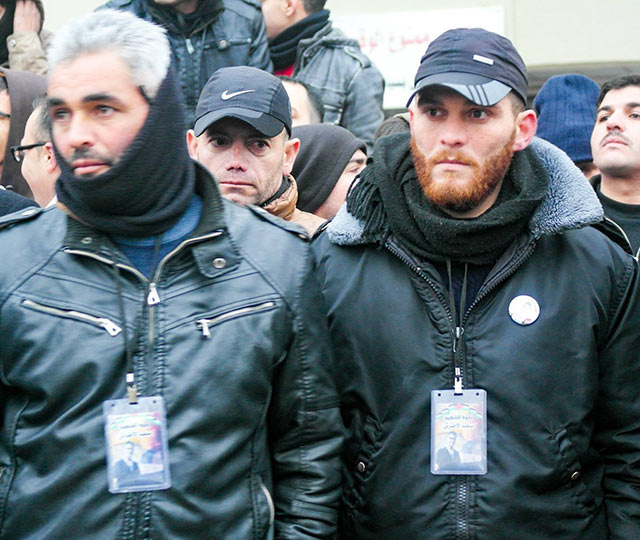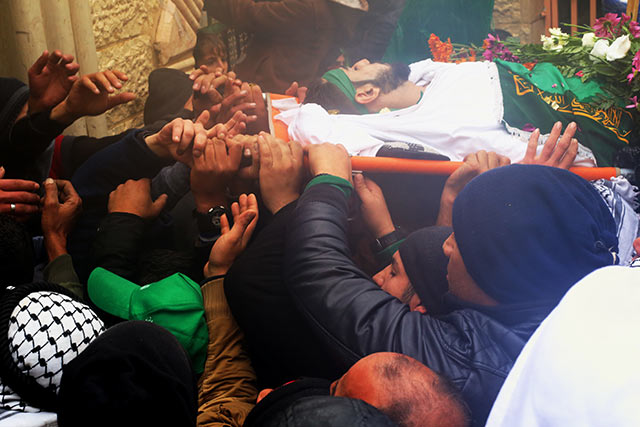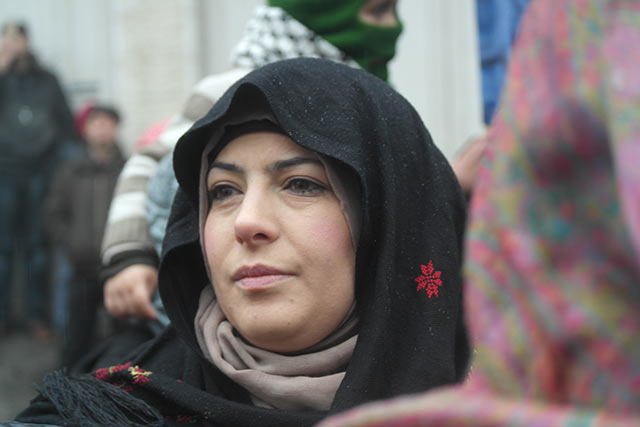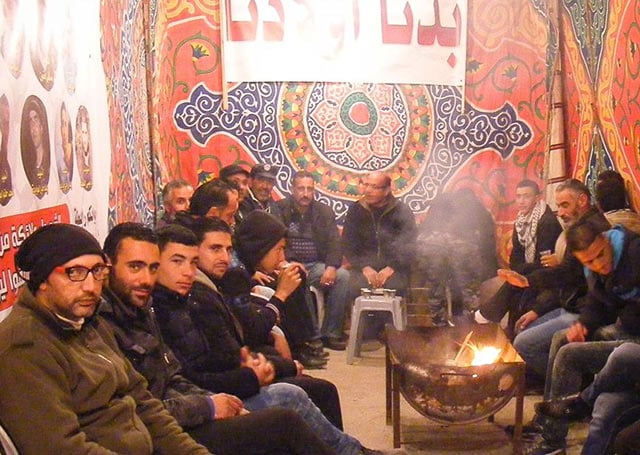
On New Year’s Day here in Hebron, after months of painstaking waiting and deliberations, the parents of 17 slain Palestinians finally received the bodies of their children. Killed by US-backed Israeli armed forces in and near Hebron over the course of the last three tumultuous months of 2015, and held by the Israeli government without explanation, the bodies of the Palestinians were finally brought to Hebron’s al-Ahli Hospital in the early evening of January 1. Amid hundreds of fellow Palestinians who waited in solemn solidarity, the families of the deceased took the bodies of their loved ones home in order to prepare them to be honored and buried the next day. (According to Islamic law, burials should happen as soon as possible following the time of death.)
For months now, in conversations initiated by international human rights workers, journalists and the occasional audacious tourist in Hebron, one question has flowed and continues to flow like a steady stream: Why did Israel refuse to restore the bodies of 17 slain Hebronites to their families for a period, not of days, not of weeks, but of months? It’s a question that doesn’t arise in conversations between Palestinians, however. When it comes to the Israeli occupation, after all, Palestinians know that the unanswerable is standard protocol.
In mid-November, several fathers of the deceased Palestinians from Hebron received permission from the International Red Cross to construct a makeshift tent in front of the IRC’s Hebron headquarters. The fathers placed an empty coffin in front of the tent, in plain view of any and all pedestrians walking down Ein Sara Street. Inside the tent, the fathers began to hold vigil, and to repeat their simple motto to any who would stop to ask their purpose: “We need our children.”
 The waiting nears its end. Family members stand vigil one last time, awaiting the bodies of their loved ones at al-Ahli Hospital, Hebron. (Photo: Christian Peacemaker Teams)
The waiting nears its end. Family members stand vigil one last time, awaiting the bodies of their loved ones at al-Ahli Hospital, Hebron. (Photo: Christian Peacemaker Teams)
Negotiations with Israel’s armed forces ensued. Israel pleaded no defense for the government’s choice to keep the bodies of the slain young men and women in deep freeze. The Jerusalem Legal Aid and Human Rights Center volunteered to represent the families during the negotiation process, and Hisham Sharabati, a coordinator and field worker with the Hebron Defense Committee, worked closely with the families as an advocate and adviser.
“At one point military officials offered to release five of the bodies,” Sharabati explained, “but only on the condition that the families agree to hold their funerals at night with a limited number of mourners.” The parents decided collectively to refuse these conditions. “The families were committed to getting each and every one of their children back,” Sharabati said.
 Funeral prayers are conducted at al-Hussein Mosque, January 2. (Photo: Christian Peacemaker Teams)
Funeral prayers are conducted at al-Hussein Mosque, January 2. (Photo: Christian Peacemaker Teams)
As the death toll among Hebronites rose during the continuing tumult of the fall and early winter, fathers from the “Solidarity Tent,” as it began to be called, visited newly bereaved families to offer them support. To show support and solidarity, Christian Peacemaker Teams, the international human rights organization with which I work, visited the tent frequently. During one of our visits, we asked the men about their wives and surviving children. “My wife cries constantly throughout the day,” said one of the men, who asked to remain anonymous. Unsurprisingly, he confirmed that the surviving children were terribly frightened. “My youngest daughter has to pass the checkpoint where the soldiers shot and killed her older sister,” he explained. “She asks me, ‘Baba, will they shoot me too?'”
The most heartbreaking story we heard in the tent was that of Jihad Irsheid. On October 25, Israeli forces killed Irsheid’s 17-year-old daughter, Dania, at the checkpoint beside the Ibrahimi Mosque as she was making her way home from school. An Israeli spokesman claimed that Dania had a knife, though eyewitness accounts dispute this. Then on December 9, as he sat with his friends in the tent, Jihad received a call to say that the Israeli military had shot his 24-year-old son Uday during a demonstration in the Ras al-Jura neighborhood of Hebron. By the time Jihad reached the hospital, Uday was dead.
 After the funeral prayers are completed, the bodies are carried into the Martyrs Cemetery, where they are buried in a joint burial. (Photo: Christian Peacemaker Teams)
After the funeral prayers are completed, the bodies are carried into the Martyrs Cemetery, where they are buried in a joint burial. (Photo: Christian Peacemaker Teams)
Israel’s practice of withholding Palestinian bodies was commonplace during the second intifada (September 2000 – February 8, 2005). Since then, this has been the first period during which Israel has carried out the practice with such zeal. If it is meant to stem violence on the part of Palestinians – violence that continues to represent a fraction of that inflicted by the Israeli military and extremist Israeli settlers – the policy has been an abysmal failure. Like most if not all policies designed to humiliate and degrade, the policy of withholding bodies only fans the flames of unrest and desperation among Palestinians.
On November 5, Israeli Defense Minister Moshe Yaalon himself conceded as much, saying that “holding onto bodies is in itself not a deterrent.” He then announced that dead bodies would be returned on a “case-by-case basis,” as if that were a step toward rapprochement rather than the continuation of a cruel and arbitrary system in which Israel may deny mourners access to their loved ones’ bodies at any time.
International humanitarian law is plainspoken on the matter of the fallen: “IHL Rule 115. Disposal of the Dead – The dead must be disposed of in a respectful manner and their graves respected and properly maintained.”
That US-backed Israel would choose to flout this basic human decency, among all of the other international covenants it disregards, shows how low its government has stooped. How much longer will the international community continue to tolerate such cruel abuses of international law? When will our silent world find its voice and say “enough”?
 A general strike called throughout Hebron enables thousands of Palestinians to attend the funeral and burial, and to observe a day of collective mourning. (Photo: Christian Peacemaker Teams)
A general strike called throughout Hebron enables thousands of Palestinians to attend the funeral and burial, and to observe a day of collective mourning. (Photo: Christian Peacemaker Teams)
 “We Need Our Children”: Fathers and other family members gather in the Solidarity Tent, waiting and calling for the return of their children’s bodies. (Photo: Christian Peacemaker Teams)
“We Need Our Children”: Fathers and other family members gather in the Solidarity Tent, waiting and calling for the return of their children’s bodies. (Photo: Christian Peacemaker Teams)
Join us in defending the truth before it’s too late
The future of independent journalism is uncertain, and the consequences of losing it are too grave to ignore. To ensure Truthout remains safe, strong, and free, we need to raise $44,000 in the next 6 days. Every dollar raised goes directly toward the costs of producing news you can trust.
Please give what you can — because by supporting us with a tax-deductible donation, you’re not just preserving a source of news, you’re helping to safeguard what’s left of our democracy.